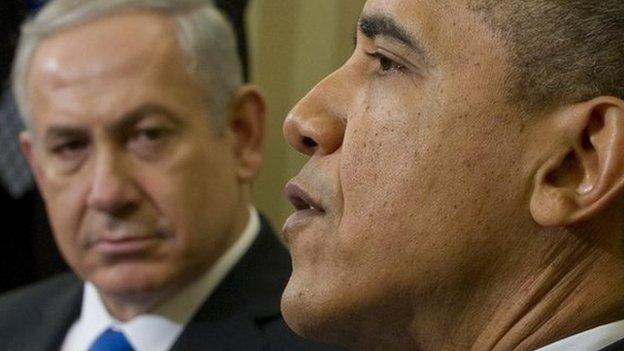Have Israel-US relations reached a new low?
- Published
- comments

These are turbulent times for the relationship between Israel and its closest ally, the US.
In part, it is due to the lack of chemistry between the Israeli Prime Minister, Benjamin Netanyahu, and the US President, Barack Obama. But there are issues of substance too.
Their difficult relationship was hardly improved by Mr Netanyahu's decision, during Israel's recent general election campaign, to accept an invitation from the Republican Party leadership to give a joint address, external to Congress.
The Israeli prime minister used this as an opportunity to lobby against the nuclear deal that Mr Obama is seeking to negotiate with Tehran.
Then there is also the moribund peace process between Israel and the Palestinians.
Earlier this month, President Obama gave a revealing interview, external to Israel's Channel 2 television station.
It was an opportunity to speak directly to the Israeli public; to try to convince them of his fundamental support for the Jewish state. But he injected a warning note too.
He argued that if the current "status-quo" between Israel and the Palestinians were not resolved, then demographics and the frustration of the Palestinians would force Israel into a choice "about the nature of the Israeli state and its character".

The Gaza unrest has strained diplomatic tensions
There was a risk, he said, of Israel losing its "essential values".
And he went further, warning that there could be more immediate diplomatic consequences too.
If there were no progress towards peace, Mr Obama said, there would be an impact upon "how we approach defending Israel on the international stage round the Palestinian issue".
He then followed up with strong hints that the US might not necessarily obstruct any European effort to bring a resolution on the Palestinian problem to the UN Security Council.
Rift 'created'
So how bad have relations between the two allies become?
Aaron David Miller, a former US Middle East negotiator, now at the Wilson Centre in Washington DC, told me that Mr Netanyahu's speech to Congress had "created a rift and opened up the field for a degree of criticism of Israel that, frankly, I have not witnessed before in 20-plus years of working for half a dozen secretaries of state".
He added: "I have never seen it play out the way it has, and that I think is quite damaging."

George W Bush had a warm relationship with his Israeli counterparts
JJ Goldberg, a senior columnist with the Forward and one of the most astute commentators on issues relating to Israel and the US Jewish Community, told me: "It is hard to overstate the depth of suspicion toward the Obama administration within Israeli government circles and among Israel's closest allies in the US.
"The suspicion and hostility have had an impact over time, leaving the administration and its supporters disappointed, frustrated and insulted at the level of contempt directed at them from Israel."
However, he added: "It doesn't seem to have shaken the underlying feelings of sympathy among governing and leadership circles here toward Israel as a nation and a symbol."
This is what Prof Shai Feldman, director of the Crown Centre for Middle Eastern Studies, at Brandeis University, calls the "schizophrenia" in US policy towards Israel, and he explains it this way.
He told me: "The continued and significant military support for Israel, despite sharp disagreements between the two principals, results from the fact that while President Obama's understanding and interpretation of Israel's best interests differs sharply from Netanyahu's, the president is genuinely committed to Israel security and survival, and, in that, he reflects the broader support for Israel in American public opinion, in key constituencies, and in the US Congress."
Different directions
So what went wrong?
Mr Goldberg said: "The most important fact is that after eight years of George W Bush, with his deeply conservative and essentially Manichaean outlook - an outlook that comforts Israelis' sense of isolation - the two countries simultaneously changed governments in radically different directions.
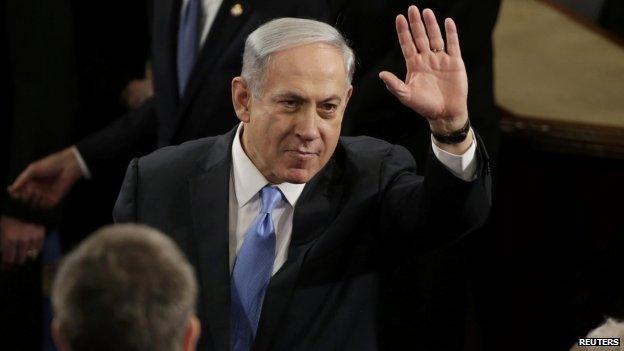
Mr Netanyahu's decision to address Congress ruffled feathers
"Israel lurched far to the right under Netanyahu, and America lurched to the left under Obama."
But there has been another significant shift too. In the process, Israel has, to an extent, become a party political issue in Washington.
Prof Feldman said: "The sharp contrast between the tense relationship between Netanyahu and Obama and the Israeli [prime minister's] close relationship with the Republican leadership in the US Congress has contributed to making Israel, for the first time, a partisan issue - a very dangerous development for the future of Israel's 'special relations with the US'."
Mr Goldberg agrees.
He said: "On the right, support for Israel has become a symbolic banner and a political litmus test in a way that Israel never was in America before.
"It's often the second or third thing out of any Republican's mouth after low taxes and abortion, and sometimes even ahead of abortion.
"The left side ranges from troubled support for Israel to open hostility."
It is not just the political class that is divided by Israel.
Prof Feldman said: "The continued ascendance of the right in Israel presents a growing challenge to the American Jewish community.
"It is important to remember that in contrast to some or even many of the politically active members of the community, most American Jews remain liberal.
"Even after the sharp clashes between President Obama and Prime Minister Netanyahu during Obama's first term, some 70% of American Jews voted for Obama's re-election in 2012.
"This is why Israel becoming a partisan issue is so dangerous: the reaction of the liberal Jewish community to Republican leaders increasingly appearing to 'own' the Israel issue places the community's relations with Israel in uncharted waters."

US Jewish vote:
2012: Obama (Democrat) 69% of Jewish vote, Romney (Republican) 30%
2008: Obama (Democrat) 78%, McCain (Republican) 22%
2004: Kerry (Democrat) 76%, George W Bush (Republican) 24%
2000: Gore (Democrat) 79%, George W Bush (Republican) 19%
1996: Clinton (Democrat) 78%, Dole (Republican) 16%
1992: Clinton (Democrat) 80%, George Bush Sr (Republican) 11%

Bumpy road ahead
Mr Miller said Mr Netanyahu and Mr Obama were now seeking to take a break from what he called "the Barack-Bibi wars", not least because the president's focus now was on the emerging nuclear deal with Iran.
However, he said there could still be an even more bumpy road ahead, since there could be one last US push on the peace front.
"I think the Obama Administration will do something," he told me.
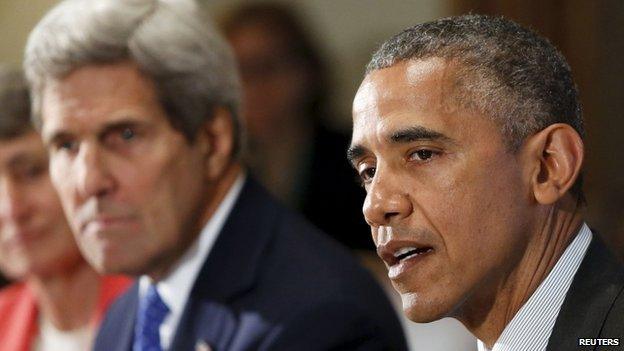
John Kerry and Barack Obama may push for peace between Israel and the Palestinians
"I think it is in their DNA. Both Secretary of State Kerry and the president himself will want to leave something behind.
"That's why the next 20 months could be very difficult in terms of the relationship between the prime minister and president."
Nobody should be in any doubt, he said, about the abiding nature of the security relationship between Israel and the US.
"I think the US-Israeli security piece of this - I won't say it's untouchable - but it exists in a compartment, which under the circumstances that exist in the region today, is going to be secure," he said.
"The US-Israel relationship really is too big to fail. Under the next president - whether it is a second Clinton or a third Bush - things are likely to improve, but the US-Israeli relationship has entered a new phase."
Mr Goldberg agreed that the bedrock of the US-Israel relationship remained stable.
"The dispute over specific diplomatic policy issues is to a degree superficial and doesn't touch the deeper relationships in intelligence and defence, technology, finance, cultural exchange and more," he said.
However, he added: "If Israel continues pursuing a policy in the West Bank that puts it at odds with the rest of the world, eventually America will probably no longer be able to stand alone with Israel against the world."
- Published24 March 2015
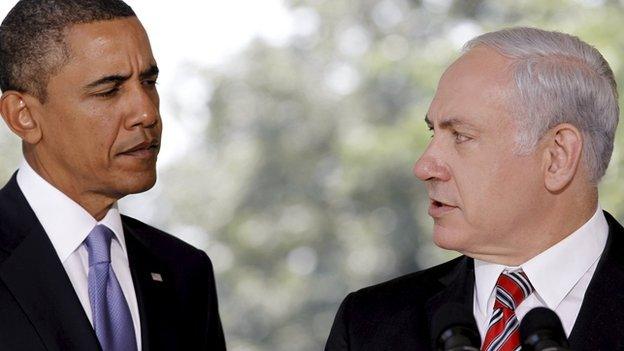
- Published19 March 2015

- Published18 March 2015
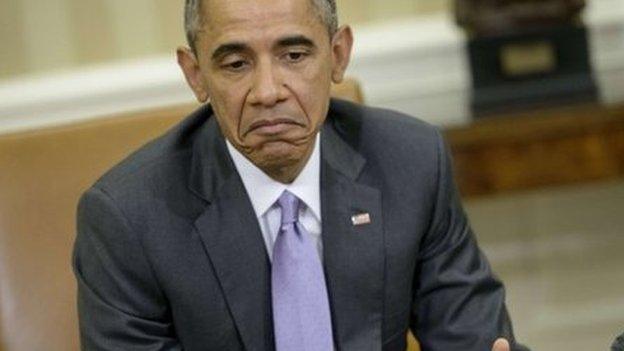
- Published26 February 2015
